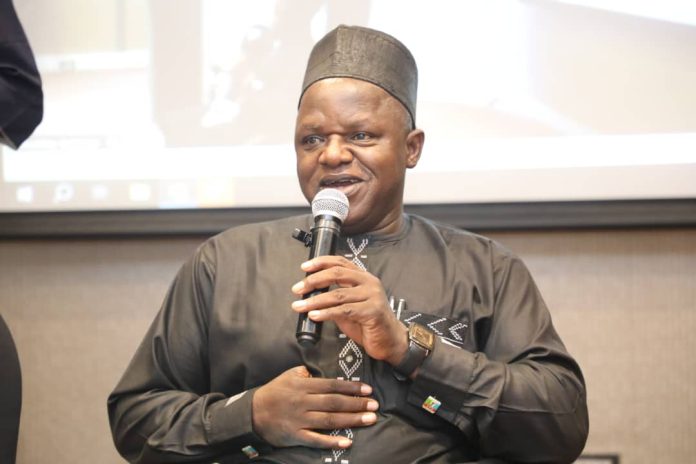Abuja, September 9, 2024 — The National Commission for Persons with Disabilities (NCPWD) has reaffirmed its commitment to ensuring justice for Persons with Disabilities (PWDs) in Nigeria, as the Commission launched a two-day sensitization workshop in Abuja. The workshop, which commenced today, focuses on strengthening institutional capacity to guarantee fairness and accessibility in the administration of justice for PWDs.
In his opening remarks, the Executive Secretary of NCPWD, Chief Ayuba Gufwan, expressed a strong commitment to creating an express platform for PWDs to access justice, particularly in cases of discrimination and rights violations. He emphasized that access to justice for PWDs is not only crucial but also non-negotiable, as it is a fundamental right that must be upheld by every segment of society.
“Today is very significant because for far too long, many persons with disabilities have suffered in silence, facing systemic denials and widespread discrimination. Some have even faced depression due to maltreatment from different parts of society,” said Chief Gufwan. “But with the establishment of the Commission and continued advocacy, we are witnessing an era where the rights of PWDs are being acknowledged and protected.”
Acknowledging the Role of Disability Partners
Chief Gufwan extended his gratitude to various advocacy organizations and disability partners who have been relentless in their efforts to champion the rights of PWDs. He praised their role in creating awareness and fostering a culture of inclusivity. In particular, he commended the International Institute for Democracy and Electoral Assistance (IDEA) for supporting the NCPWD in organizing the workshop, which he described as a critical step towards empowering legal practitioners and ensuring justice for PWDs in Nigeria.
“This workshop is one of many initiatives aimed at educating legal practitioners on the provisions of the Disability Act and how it applies to the administration of justice for persons with disabilities,” Chief Gufwan added.
He urged participants to make the provisions of the Disability Act “a living document,” emphasizing that the Act should be more than just words on paper but a real guide in ensuring equal rights for PWDs in the judicial system.
Amendments to Strengthen the Disability Act
One of the key highlights of the technical session was a presentation by Marcus Florence, who took participants through critical sections of the Disability Act, specifically focusing on how the law addresses access to justice for PWDs. Florence argued that while the Act is progressive, it still needs to be amended to provide clearer and more direct pathways for PWDs to access justice.
“The Disability Act is a good foundation, but it requires further amendment to ensure that it fully accommodates the needs of persons with disabilities, especially in terms of access to justice,” Florence said. She pointed out sections 38 and 39, which define the role of the Commission, stating that the law needs to go beyond these provisions and ensure that PWDs have direct and unfettered access to legal remedies.
Ensuring Compliance and Accommodation
Also speaking at the workshop, Barrister Ikem Uchegbulam, Director of Compliance and Enforcement at the Commission, emphasized the need for full compliance with the Disability Act. He stressed that public infrastructure and legal systems must provide reasonable accommodations for PWDs to ensure they can access justice without facing unnecessary barriers.
“Public infrastructure must be designed and maintained in a way that it accommodates persons with disabilities. It is not just a matter of policy but a matter of compliance with the law,” Uchegbulam stated.
He called on the government, judiciary, and private sectors to work together to create inclusive spaces that recognize the unique needs of PWDs.
Legal Protections and Redress for PWDs
The Director of Legal Services at NCPWD, Mr. Joseph Okon, provided a detailed overview of the legal protection mechanisms available to PWDs under the Prohibition of Discrimination against Persons with Disabilities (2018) Act. During his presentation, Okon discussed the operating guidelines for redress in cases of discrimination against PWDs, outlining the steps individuals can take when their rights are violated.
Mr. Okon also informed attendees about the monitoring system established by the Commission’s Legal Unit to ensure that incidents of discrimination and abuse against PWDs are promptly addressed. The system is designed to uphold the principles of inclusivity and provide a safety net for victims seeking justice.
“This monitoring system is key to ensuring that PWDs are protected and that their cases are not overlooked or delayed. We want to ensure that justice is not only accessible but also swift and fair,” Okon said.
The Way Forward
As the workshop continued, participants, including prominent legal practitioners and disability rights advocates, engaged in discussions on the challenges and solutions for ensuring justice for PWDs in Nigeria. Representatives from the Disability Rights Commission of Anambra State and the Judicial Council were also in attendance, lending their expertise and support to the initiative.
Chief Gufwan concluded the day’s sessions by reiterating the Commission’s commitment to making life easier and more dignified for PWDs across the country. He called for continued collaboration between government agencies, non-governmental organizations, and international partners to achieve this goal.
“Let us continue to work together to build an inclusive Nigeria where no one is left behind. Access to justice for persons with disabilities is not just a goal—it is our collective responsibility,” Chief Gufwan said.
The workshop will conclude on September 10, 2024, with actionable recommendations expected to be made for the amendment and full implementation of the Disability Act.
By: Mbanefo JohnMichaels I
Head, Press and Public Relations Unit, NCPWD


